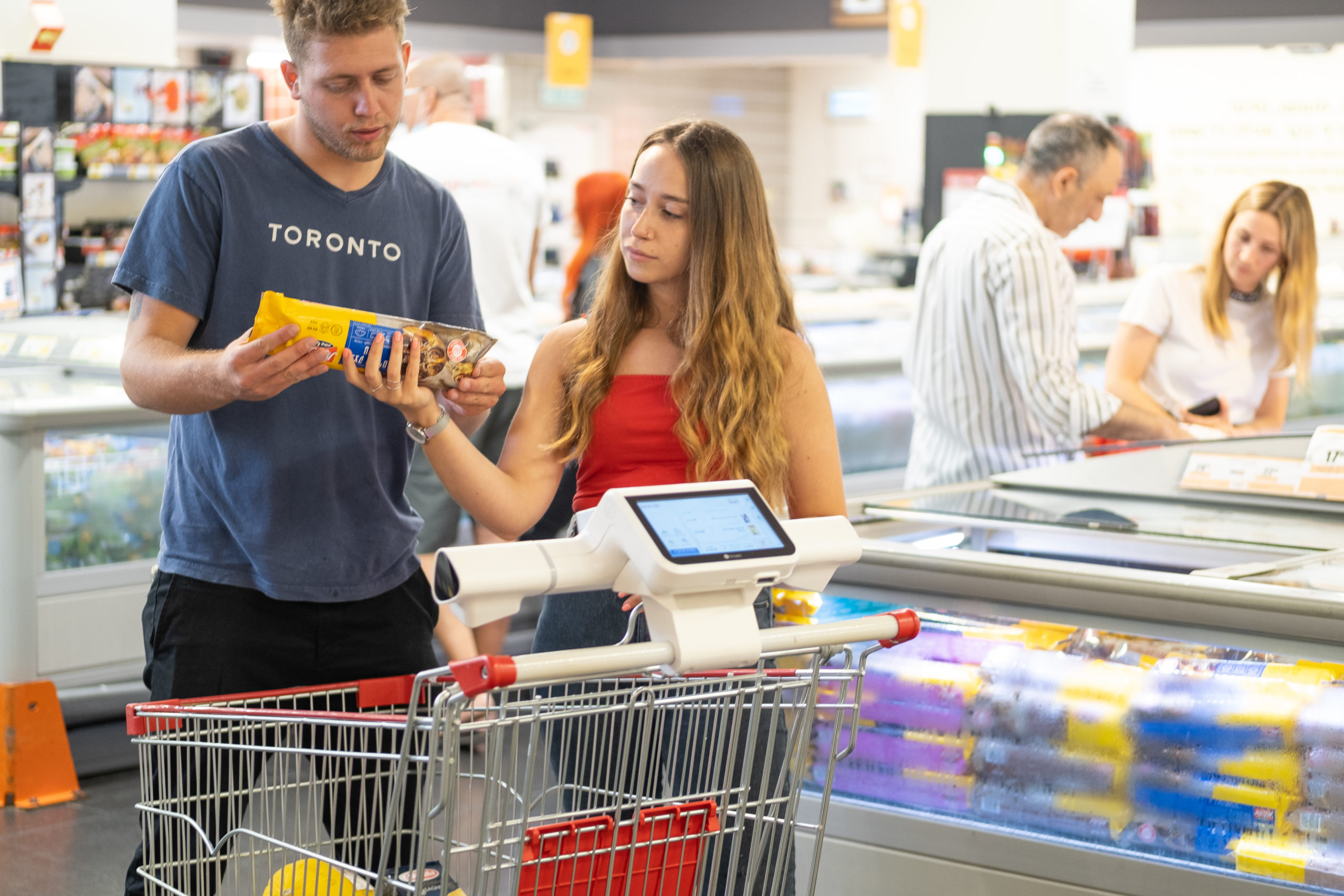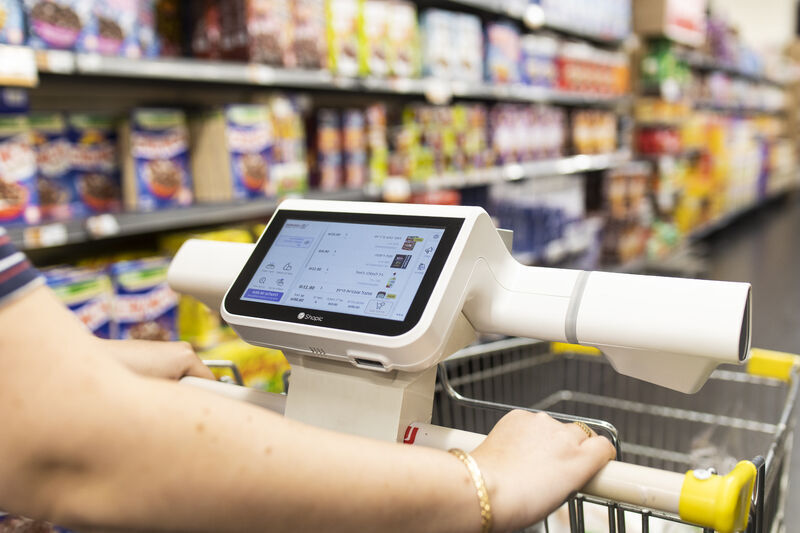Stores face new challenges in a world forever changed by the pandemic. Amazon and other tech giants are encroaching on their business. But perhaps more urgently, supply chain snarls haven’t gone away, presenting retailers with a host of inventory issues. In a March Retail Insights survey, seven in 10 (71%) shoppers said they felt that out-of-stocks — i.e. times when items aren’t available — are worse now compared to the start of the pandemic.
While there isn’t a silver bullet, Raz Golan makes the case that “smart” store technology — particularly his company’s — can help to tackle many of the stock- and retention-related problems stores wrestle with today. He’s the co-founder of Shopic, a startup that sells clip-on touchscreen hardware for shopping carts that identify items to display promotions while acting as a self-service checkout window.
Investors see potential. Today, Shopic announced that it raised $35 million in a Series B funding round led by Qualcomm Ventures, with participation from Vintage Investment Partners, Clal Insurance, IBI Tech Fund, Tal Ventures and Shufersal. While Golan wouldn’t disclose the valuation, a source familiar with the matter told TechCrunch it’s in the range of “hundreds of millions of dollars” and a “significant” upround.
Golan, previously a security researcher at Check Point and a three-time entrepreneur, co-launched Shopic in 2015 with Eran Kravitz and Dan Bendler, who also had a brief tenure at Check Point. The three met during their service in the Israeli Defense Forces, where Shopic’s model began to take form.

“We wanted to find ways to optimize shopping experiences and close the gap between online commerce and physical stores,” Golan told TechCrunch in an email interview. “Our first product was a ‘scan and go’ solution, using dedicated terminals or shopper smartphones. However, we soon realized that large supermarkets needed a different solution if they were to provide a fuller interactive experience to their customers. Hence, we developed Shopic’s unique smart cart solution.”
Shopic’s device is designed to attach to shopping carts and recharge via a wall-mounted shelf unit. Two cameras pointed toward the cart’s basket feed footage through computer vision algorithms, which recognize products as they’re put in or removed from the cart. Alongside a bill, shoppers see an in-store map of aisles and ads either for store-branded or third-party products.
Stores can connect Shopic’s platform to existing online and in-store ad platforms as well as point-of-sales and inventory systems. They also have the option of allowing customers to skip the checkout line by paying using the touchscreen.
To train its item-recognizing algorithms, Shopic updates a 50,000-plus product database on a weekly basis with as many as 10,000 new entries, Golan says. There’s a bit of an onboarding process — when Shopic’s devices are deployed in a store for the first time, they have to be exposed to every item at least once — but Golan asserts that Shopic is making progress toward streamlining installations.
“[In the supermarket,] new items are added every week, and existing items change their appearance and need to be re-trained,” Golan said. “We’ve built tools, both internal and external, for collecting, maintaining, and making data accessible more easily — for example, automatic detection of package changes, in order to keep up-to-date data only … [O]ur algorithms learn and improve automatically throughout the usage of the system. In this manner, even if a new item goes on the shelves without being trained at all, within a day, or even a few hours, it can already be trained and recognized automatically by the system.”
This year, Shopic plans to expand the amount of data it collects by introducing side-facing, shelf-capturing cameras on the device. The cameras will look for missing products as well as price-tagging errors, Golan says, and whether the shelves are aligned with planograms, the diagrams showing where items should be placed in order to maximize sales.
“This will provide highly valuable data for optimizing the store and its inventory,” Golan said.
Shopic claims to be working with “some of the largest supermarkets” in Europe, the Americas and Israel, but the startup faces an uphill battle in its quest to corner the market for “smart cart” tech. Amazon has a rival technology called Dash Cart that’s currently being piloted in select Whole Foods and Amazon Fresh locations. Instacart owns Caper AI, a company that was developing self-checkout shopping carts, including several that were tested in an Ohio Kroger store. Israeli startup WalkOut offers a device similar in capabilities to Shopic’s, and Veeve — one of Shopic’s closest rivals — recently brought its shopping cart platform to Albertsons stores via a partnership.

Shopic has indirect competitors, too, in “cashierless” solutions like Trigo, AiFi and Grabango, which use systems of cameras to spot which items shoppers grab and automatically check them out once they exit the store. Two years ago, Amazon began licensing such a system, Just Walk Out, to third-party merchants after expanding it beyond its Amazon Go stores to Whole Foods locations.
But taking a step back for a moment, it’s not clear that shoppers want “smart carts” in the first place. Walmart understandably received blowback for a patent describing a smart cart that could measure a shopper’s heart rate, temperature, speed and the amount of force they applied to the handle as they walked around a store. Smart shopping carts also collect troves of personal data, for example partial debit and credit card numbers, that aren’t always handled securely. A security report in October 2021 found that Caper’s system was leaking data through the electronic receipts it sent via SMS.
Golan says that Shopic has taken pains to protect privacy, anonymizing purchase data and blurring shopper’s faces if they’re captured by the cameras. He also says that the company isn’t using data for monetization or “any purpose outside the boundaries of the platform,” emphasizing that the data is owned by Shopic’s retail customers. Shopic only makes money by charging customers a subscription fee for use of both its hardware and software.
Whether shoppers want them or not, the allure of smart carts might be too strong for retailers to resist — especially if the price is right. By expediting the checkout process, they reduce the need for labor, an appealing prospect at a time when worker shortages remain widespread. Moreover, smart carts’ ability to track shoppers’ preferences in detail promises to boost purchases — at least in theory. Citing internal data, Golan says that Shopic has increased shoppers’ monthly spending by as much as 8% at some stores.
“Our solution is fully commercial, and to date, our smart carts have processed transactions worth hundreds of millions of dollars by tens of thousands of shoppers,” Golan continued. “The pandemic actually accelerated interest in our solution since it increased demand for contactless shopping solutions and bolstered the need for more hybrid approaches to food retailing, one that combines the best of online commerce and physical stores. We do not experience much impact from the general slowdown in tech since we serve an industry that is typically less cyclical and because our solution is geared toward optimization and saving, anyway. That said, we do monitor the macro situation all the time and make sure we conduct ourselves carefully and frugally.”
In the coming months, Shopic — which has raised $56 million in capital to date — plans to focus on customer acquisition and ramping up deployments with existing customers. The company also intends to expand its headcount, hiring roughly 30 employees to grow to more than 100 total by the end of the year.































Comment